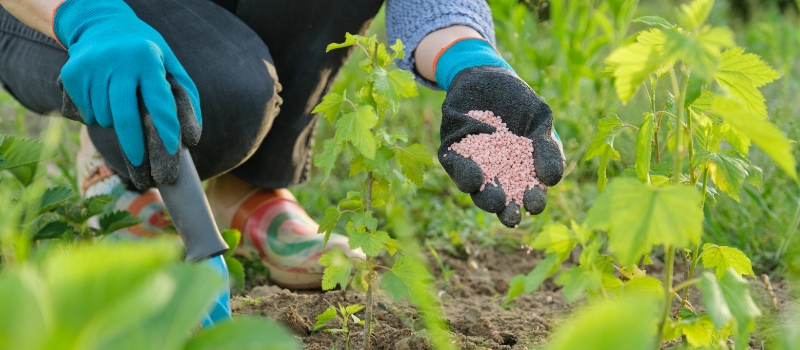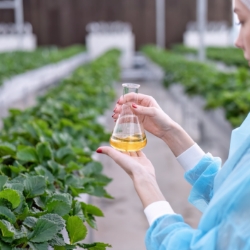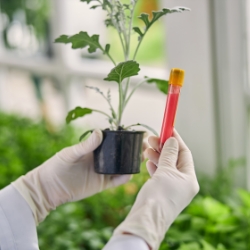Sample Preparation
Depending on whether a fertilizer is solid or liquid, the sample must be dissolved or well-mixed without clumps before sending it to a fertilizer testing lab.
Fertilizers are vital to the success of crops and plants, especially if the farming soil lacks the necessary soil properties and nutrients. However, using just any fertilizer may fall short of providing desired results or cause nutrient pollution, harm the environment, and risk human health. That is where fertilizer analysis and testing come in.
Fertilizer analysis and testing determine the amount of macronutrients nitrogen, phosphorus, and potassium (NPK) in organic and mineral fertilizers. Typically done in a fertilizer testing lab following a soil sampling analysis, these methods have been scientifically proven effective in improving soil fertility and optimizing crop production.

4 Essential Purposes of Fertilizer Analysis and Testing
A fertilizer test reveals valuable information to farm managers and agricultural professionals. They can use this data to determine the best fertilizer application and soil management practices. Here are four significant reasons why fertilizers must be inspected and analyzed:
#1 Ensure Correct Nutrient Levels
Plants require the right amounts of nutrients. If the soil lacks the necessary nutrients, organic and synthetic fertilizers can make up for it. However, when using organic, mineral fertilizers, and solid farm manure, such as compost, biogas, farmyard manure, and slurry, there may be instances where phosphorus is insufficient. Fertilizer testing will detect this and help farm managers decide to add the correct amount of phosphorus fertilizer for the plants and crops to thrive.
#2 Prevent Over-Fertilization
Over-fertilization leads to excessive nutrient levels that can damage crops and the environment. For instance, too much nitrogen fertilizer causes excessive plant growth and abnormally dark green leaves and may promote insect outbreaks. Similarly, fruiting plants may delay fruit maturity or even reduce fruit production when exposed to too much nitrogen. Performing a fertilizer test in-house or in a fertilizer testing lab lessens the risk of over-fertilization.
#3 Avoid Environmental Contamination
Fertilizers may contain heavy metals and other harmful chemicals that can contaminate soil and water systems. Analyzing organic and inorganic fertilizers and using the correct types and amounts of fertilizers prevent over-fertilization and protect the environment from nutrient pollution.
#4 Maintain Healthy Soil
An NPK soil test kit detects the presence of nitrogen, phosphorus, and potassium in a soil sample. Through it, growers can identify whether the land needs a nitrogen fertilizer or lacks phosphorus fertilizer. Fertilizer analysis and testing then determine whether or not synthetic fertilizers have the necessary nutrients to achieve and maintain the desired soil health.
General Steps to Test Fertilizers in Agricultural Laboratories
Fertilizer testing uses chemical analysis to determine the nutrient composition and concentration in a fertilizer sample. Below are some of the general steps involved in testing fertilizers in a lab:

Sample Preparation
Depending on whether a fertilizer is solid or liquid, the sample must be dissolved or well-mixed without clumps before sending it to a fertilizer testing lab.

Nutrient Analysis
Lab technicians can use different techniques, such as spectroscopy or chromatography, to analyze the fertilizer’s nutrient content and value. Other than testing nitrogen, phosphorus, and potassium, they can also measure the pH of the sample, look for traces of heavy metals and other pollutants, detect the moisture using a moisture balance, and perform micronutrient testing to gauge the level of iron, zinc, and copper in the fertilizer.

Plant Growth Trials and Analysis
Labs can evaluate the effectiveness of a fertilizer sample based on data collected from the plant growth in soils mixed with fertilizer samples and in those without any fertilizer.
Sources:
https://www.azocleantech.com/article.aspx?ArticleID=1493
https://anaconlaboratories.com/soil-and-agriculture/fertilizer-testing/
https://www.tribhakti.com/the-importance-of-fertilizer-inspection-and-testing/
https://www.ages.at/en/plant/fertilizer/fertilizer-testing
https://byjus.com/biology/fertilizers/
https://measurlabs.com/methods/compost-and-fertilizer-testing/
https://ipm.ucanr.edu/PMG/GARDEN/PLANTS/DISORDERS/nitrogenexcess.html